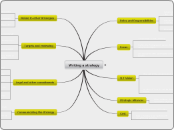Floating topic
Microbial groups
Viruses
ecological functions
causes disease in human
biological warfare
replication steps:
a)attachment/absorbtion
b)penetration
c)replication
d)assembly
e)release
obligate intracellular parasites
cannot replicate outside the cells
procaryotes
bacteria:various morphology
ecolgical function
recycling of chemical components
symbiotic relationships
environmental applications
photoautotrophs
chemotrophs
autotrophs
heterotrophs
Subtopic
binary fission
Eucaryotes
fungus:primary terrestrial,few freshwater and marine
reproduction
sexual,asexual or both
ecological impact
decomposers
pathogens
feeding forms:
saprobic heterotrophs
parasitic heterorophs
mutualistic heterotrophs
slime/water molds:resemble fungi in appearance and style
ecological functions:
engulf bacteria
decomposer and consumer in ecosystem
nutrient recycler
cause disease
Oomycota
Acrasiomycota
Myxomycota(plasmodial slime molds)
algae:simple aquatic plants,lack of vascular conducting system and simple reproductive system
ecology
seaweed
phytoplankton(food base for marine food chains)
Reproduction:sexual or asexual reproduction
Nutrition:photoautotrophic or chemoheterotrophic
distribution
planktonic
benthic
neustonic
protozoa:motile eucaryotic unicellular protist
ecological role
interaction with higher organism
in marine food chain
Reproduction
asexual:binary fission
sexual:conjugation
nutrition
holozoic nutrition
saprozoic nutrition









